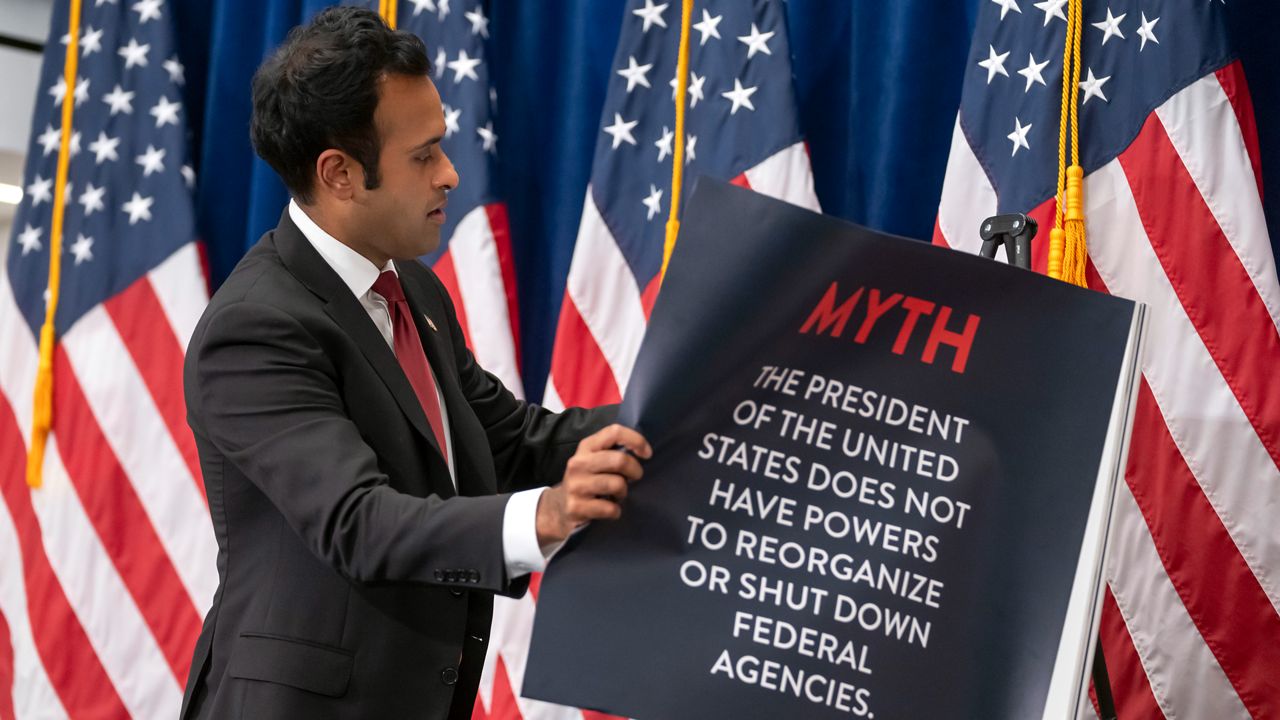If presidential candidate Vivek Ramaswasmy gets elected and ends up leading the nation’s executive branch, he wants to gut it through unprecedented means — including a 75% decrease in government employees and the elimination of at least five agencies.
The biotech entrepreneur worth hundreds of millions has never held elected office and only sparingly voted in elections as an adult. But in a speech on Tuesday, he laid out a vision of a federal government so small it would unwind an American bureaucracy hundreds of years in the making.
“Do we want incremental reform or do we want revolution?” Ramaswamy asked an audience at a Washington, D.C., think tank started by Trump administration alumni in 2021.
What You Need To Know
- If elected president, Vivek Ramaswasmy wants to eliminate the FBI; the Bureau of Alcohol, Tobacco, Firearms and Explosives; the Department of Education; the Nuclear Regulatory Commission and the Department of Agriculture’s Food and Nutrition Services
- Within a year in office, Ramaswamy said he would plan to cut the federal workforce in half. By the end of his term, he would aim for reductions of more than 75%
- If Ramaswamy got his way, he would put over one million Americans out of work by the end of 2025
- The ideas, while radical, are hardly unique to Ramaswamy among his fellow 2024 GOP presidential primary competitors as well as congressional Republicans. Ramaswamy’s ideas may very well be attempted by the next president, even if he’s not the man to do it
The agencies slated for complete elimination in a Ramaswamy administration: the FBI; the Bureau of Alcohol, Tobacco, Firearms and Explosives; the Department of Education; the Nuclear Regulatory Commission and the Department of Agriculture’s Food and Nutrition Services.
“A radical dream that I have, that many of us in this room share today as citizens in 2023: that the people who we elect to run the government ought to be the ones who actually run the government,” he said. “Not the managerial bureaucracy in three letter government agencies, not elite leaders in the back of palace halls in old world England, not enlightened elites in the back of BlackRock’s corner office in Park Avenue of Manhattan today, not monarchs sitting in three letter government agency buildings here in Washington, DC.”
“This is not a Black idea or a white idea. This is not even a Republican idea or a Democratic idea. This is a fundamentally American vision that we fought a revolution to secure in 1776 that we the people create a government that is accountable to us, not the other way around,” the Republican presidential candidate continued.
Within a year in office, Ramaswamy said he would plan to cut the federal workforce in half. By the end of his term, he would aim for reductions of more than 75%. And the number of regulations would also be cut by 50%.
The federal government employs roughly 2.2 million civilian employees, according to the nonpartisan Congressional Budget Office, 60% of whom work for the Departments of Defense, Homeland Security and Veterans Affairs. If Ramaswamy got his way, he would put over one million Americans out of work by the end of 2025 with the stroke, or likely several strokes, of a pen.
“This isn't that I have a vendetta against any of these individuals who are working in these agencies to the contrary, many of these are good people, individual people living their lives privately in their own families,” Ramaswamy said. “This is no personal animus against any of them. It is a machine that's actually the source of that problem.”
2024 GOP candidates vs. federal bureaucracy
Ramaswamy's ideas are hardly unique among his fellow 2024 GOP presidential primary competitors.
Earlier this year, Florida Gov. Ron DeSantis pitched shutting down the IRS and the Departments of Education, Commerce and Energy. He’s also called for “defunding” the Department of Justice and the FBI, whose prosecutions of former President Donald Trump and defendants in Jan. 6, 2021, Capitol riot cases have garnered them the anger of the American right.
Trump also has expressed his desire to defund federal law enforcement. And in a speech last year to the same group Ramaswamy addressed, Trump himself endorsed a strategy developed by the America First Policy Institute to give president’s greater authority to terminate federal employees unilaterally.
“To drain the swamp and root out the deep state, we need to make it much easier to fire rogue bureaucrats who are deliberately undermining democracy,” Trump said. “Congress should pass historic reforms empowering the president to ensure that any bureaucrat who is corrupt, incompetent or unnecessary for the job can be told — have you ever heard this? — ‘you’re fired, get out, you’re fired.’”
In national polls, Ramaswamy trails only Trump and DeSantis, albeit averaging just under 7%, according to the polling aggregator FiveThirtyEight. While Trump, the race’s frontrunner, holds a 40 percentage point lead over the field, Ramaswamy is outpacing governors, senators and a former vice president among the national Republican primary electorate.
The agencies on the cutting block
In his remarks, the relative political newcomer spent much of his time giving very detailed explanations of the laws and legal theories behind his plan, sparing only nine minutes of his roughly 35-minute remarks to explaining his reasons for eliminating each agency.
He made no specific mentions of the agencies in a 27-minute conversation on stage following his speech and also only discussed four of the five agencies he plans on ending.
The one agency that went unmentioned was the USDA’s Food and Nutrition Service, which helps provide children, families and low-income Americans with healthy food. Ramaswamy’s campaign did not immediately respond to questions about why the program was in his crosshairs.
Under his plan, 20,000 of the FBI’s 35,000 employees would be let go. The remaining 15,000 would be reassigned to the U.S. Marshall Service, the Treasury Department’s financial crimes division and the Drug Enforcement Agency.
The U.S. Department of Education would be eliminated because, as Ramaswamy put it, they spend $80 billion a year telling public schools they won’t get federal funding “unless they adopt toxic racial and gender ideologies.”
The Education Department has little to no say in public school curriculum, which is typically decided at a state or local level. They do, however, enforce civil rights policies that bar discrimination on the basis of race, sex, gender identity and other protected categories.
Policies that promote racial and gender tolerance have been in the crosshairs of most Republican presidential candidates this cycle, including DeSantis, Trump, former U.N. Ambassador Nikki Haley, South Carolina Sen. Tim Scott and former Vice President Mike Pence.
The ATF needs to be eliminated, Ramaswamy argued, because of mismanagement and its regulation of “bump stocks,” a firearm accessory that allows semi-automatic weapons fire at a rate closer to illegal machine guns. Far-right Rep. Matt Gaetz, R-Fla., has endorsed Trump, but was in the audience for Ramaswamy's speech Tuesday and recieved a shout-out from the candidate for legislation he proposed that would abolish the ATF.
The bump stocks rule in question was implemented under the Trump administration after a gunman used them to kill 58 people and wound hundreds more in Las Vegas in 2017. It is now working its way through the courts, with the Biden administration hoping to have the Supreme Court decide after lower courts ruled it was unconstitutional.
And the Nuclear Regulatory Commission, the country’s nuclear power watchdog, needs to be shuttered because he believes they are responsible for the stagnation in nuclear power plant construction in the U.S., Ramaswamy said.
He also told Axios before his speech that the IRS and Department of Commerce would be subject to massive purges in his administration.
The legal case
The legal theory behind his proposed war on federal agencies is untested. Describing “arcane stuff” in minute detail, Ramaswamy argued the president has the authority to conduct mass layoffs and reshape federal agencies without authorization from Congress.
“The U.S. president has sole authority to set the rules governing the Office of Personnel Management, which does absolutely give the duly elected President of the United States the power to single handedly execute those large scale layoffs and massive reductions in force,” the Ohioan said. “I'll tell you this: speaking as a CEO, if somebody works for you and you can't fire them, that means they don't work for you. It means you work for them because you're responsible for what they do without any authority to actually change it.”
As for the elimination of entire federal agencies, Ramaswamy pointed to a 1977 law known as the Reorganization Act. Though the law requires president’s to seek authorization from Congress to reshuffle, consolidate or abolish federal agencies, Ramaswamy believes those requirements no longer are in effect and presidents can act unilaterally.
Other presidents, most recently Obama, have tried and failed to get congressional approval for reorganizations or eliminations in the past. Ronald Reagan wanted to eliminate the Departments of Education and Energy, which both persist today.








